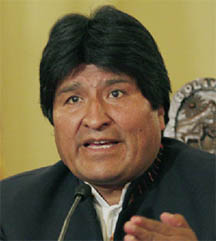THE HAGUE, (Reuters) – Bolivian President Evo Morales personally handed over documents at the International Court of Justice yesterday that support his country’s claim against Chile in an ongoing case that it hopes will win it back the sea access it lost over a century ago.

Landlocked Bolivia – which still maintains a navy – took its case to the Hague last year. It is seeking to force its neighbour to give back a Pacific Ocean passage that it lost in an 1880s war won by Chile.
“We trust that Bolivia will soon have sovereignty again in the Pacific, the arguments are on our side,” said Morales after handing over the documents.
“The sea issue will never be given up by Bolivians. As a peaceful country we have gone to international courts to ask for justice over a historical claim and we are very confident.”
Bolivia’s hopes that it could get a favourable ruling in the Hague increased in January when the international court reached a compromise decision on a case brought against Chile by Peru, awarding more than half of a disputed patch of ocean to Peru. That case took six years.
Much of Bolivia’s trade passes through Chilean ports thanks to an agreement on the transit of goods, although the two countries broke off diplomatic relations in 1978.
Chilean President Michelle Bachelet said last month that the court case had closed the door on any hopes of a bilateral deal and the government has repeatedly said it is confident that Chile has the legal arguments on its side.
“We are very clear that we respect international treaties…but we are going to first analyze the Bolivian case in order to decide how we proceed,” said Bachelet to local radio shortly before Morales presented the documents.
Chile argues its border with Bolivia was fixed by a treaty signed by the two countries in 1904. That treaty cost Bolivia some 120 kilometers of coast and 120,000 square kilometers of arid land where many of the world’s top copper reserves are located.




